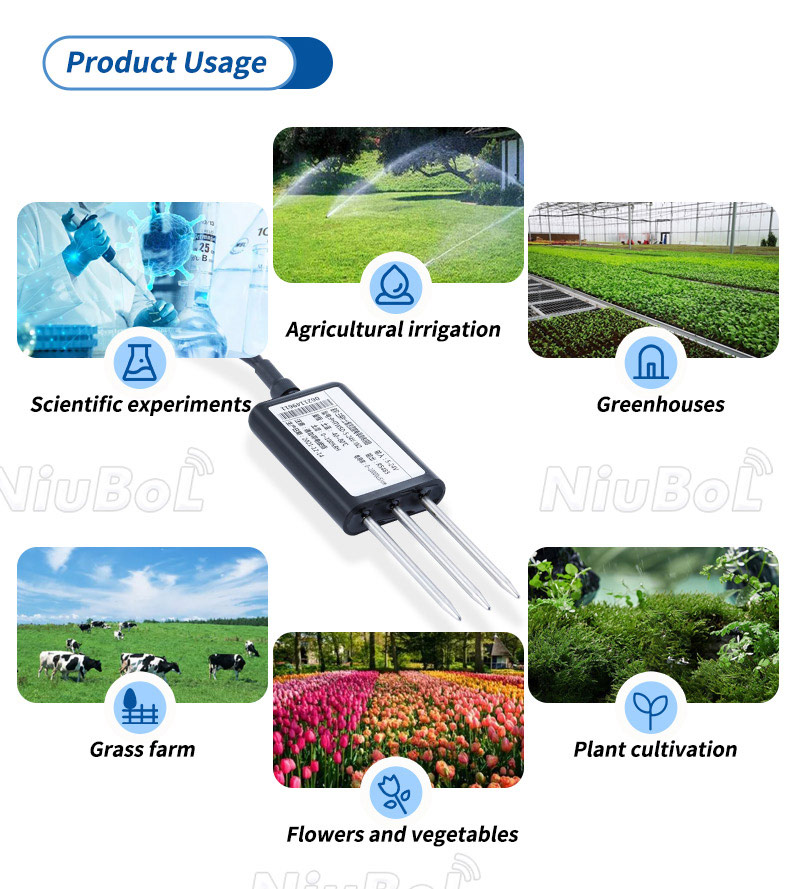

— Blogs —
—Products—
 Consumer hotline +8618073152920
Consumer hotline +8618073152920 WhatsApp:+8615367865107
Address:Room 102, District D, Houhu Industrial Park, Yuelu District, Changsha City, Hunan Province, China
Product knowledge
Time:2024-01-07 15:37:02 Popularity:914
A moisture sensor for soil is a device that measures the amount of water content in the soil. It is an important tool for farmers, gardeners, and landscapers to help optimize irrigation practices and improve plant growth.
Here are some common types of soil moisture sensors:
1. Tensiometers: These sensors measure the suction pressure or tension within the soil, indicating how tightly the water is held by the soil particles. As soil dries out, the tension increases, and as it becomes more saturated, the tension decreases.
2. Capacitance Sensors: These sensors measure the dielectric constant of the soil, which is proportional to the soil's water content. They work by sending an electrical signal through two electrodes inserted into the soil, and the amount of water in the soil affects the electrical charge.
3. Time-Domain Reflectometry (TDR) Sensors: These sensors use electromagnetic waves to measure the soil's water content. The sensor sends a pulse of electromagnetic energy down a probe inserted into the soil, and the time it takes for the reflected signal to return to the sensor indicates the soil's water content.
4. Resistive soil moisture sensors: These sensors measure the electrical resistance of the soil, which changes as the water content changes. The sensor consists of a porous block with electrodes that are placed into the soil, and the resistance changes based on the amount of water in the soil.
Soil moisture sensor is a device used to measure the amount of moisture in the soil and is commonly used in agriculture, horticulture, soil research and environmental monitoring. There are various types of soil moisture sensors, including resistive and capacitive types.
Resistive soil moisture sensors estimate moisture content by measuring the electrical conductivity of the soil.
Capacitive soil moisture sensors use the moisture in the soil to change the capacitance value of the sensor, thus inferring soil moisture.
The main purpose of soil moisture sensors is to monitor the moisture changes in the soil, which helps people to understand the plant growing environment, optimise the irrigation schedule and improve the yield and quality of crops. In addition, soil moisture sensors can also be used in areas such as environmental monitoring and soil research to help people understand soil quality and ecological conditions.
Soil moisture sensors are widely used in a number of fields, the following are their main areas of application:
Agricultural field: the agricultural field needs to understand the nature of the soil and the law of change, in order to develop a more scientific planting plan and more effective agricultural management strategy. Soil temperature and humidity sensors can help farmers, agricultural scientists and other better understanding of the state of the soil and the law of change, so as to better carry out agricultural and environmental monitoring.
Environmental monitoring field: environmental monitoring field need to monitor the changes in the environment, such as the atmosphere, water, soil and so on. Soil temperature and humidity sensors can real-time monitoring of soil internal and surface temperature and humidity, the data uploaded to the cloud or database, to help environmental monitors better understand the changing law of the environment, so as to better carry out environmental monitoring.
Scientific research field: the field of scientific research needs more in-depth study of the nature of the soil and the law of change, to explore more about the natural phenomena of the soil and scientific principles. Soil temperature and humidity sensors can help scientists better understand the nature of the soil, so as to better carry out more in-depth research.
In addition, soil moisture sensor can also be applied to water-saving irrigation, greenhouse, flowers and vegetables, grass pasture, soil quick test, plant culture, sewage treatment, food storage and other fields.

Soil moisture sensors are typically installed at various depths in the soil to monitor soil moisture content at different levels. This data helps optimize irrigation practices, prevent overwatering or underwatering, and promote healthy plant growth.
In conclusion, soil moisture sensor is an important agricultural and environmental monitoring equipment, which has a wide range of applications and is of great significance for agricultural production and ecological environment monitoring.
Related recommendations
Sensors & Weather Stations Catalog
Agriculture Sensors and Weather Stations Catalog-NiuBoL.pdf
Weather Stations Catalog-NiuBoL.pdf
Related products
 Combined air temperature and relative humidity sensor
Combined air temperature and relative humidity sensor Soil Moisture Temperature sensor for irrigation
Soil Moisture Temperature sensor for irrigation Soil pH sensor RS485 soil Testing instrument soil ph meter for agriculture
Soil pH sensor RS485 soil Testing instrument soil ph meter for agriculture Wind Speed sensor Output Modbus/RS485/Analog/0-5V/4-20mA
Wind Speed sensor Output Modbus/RS485/Analog/0-5V/4-20mA Tipping bucket rain gauge for weather monitoring auto rainfall sensor RS485/Outdoor/stainless steel
Tipping bucket rain gauge for weather monitoring auto rainfall sensor RS485/Outdoor/stainless steel Pyranometer Solar Radiation Sensor 4-20mA/RS485
Pyranometer Solar Radiation Sensor 4-20mA/RS485
Screenshot, WhatsApp to identify the QR code
WhatsApp number:+8615367865107
(Click on WhatsApp to copy and add friends)